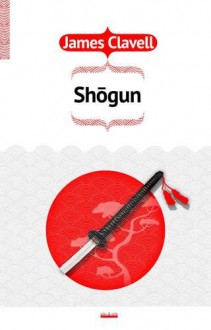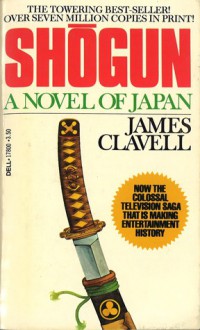
Jest dla mnie rzeczą niepojętą, że James Clavell jest tak stosunkowo mało znanym u nas pisarzem. Cały czas trwania lektury powieści Szogun próbowałem zrozumieć jak to możliwe? Bo książka tak totalnie zwala z nóg, jest tak niesłychanie dobra, że naprawdę trudno mi to pojąć.
Powieść opowiada o angielskim pilocie Johnie Blackthorne, który próbując przetrzeć szlak morski i odebrać w ten sposób nieco chwały Hiszpanom i Portugalczykom rozbija swój okręt w Japonii. Akcja dzieje się na przełomie XVI i XVII wieku, w czasie, gdy kraj ten przechodził ogromne zmiany. Zetknięcie filozofii i sposobu życia samurajów z obyczajami zachodnimi tym zmianom dopomogło, czego rezultatem było powstanie niejako nowego tworu państwowego, szogunatu. Książkę można traktować jako powieść historyczną, z jedną za to ważną uwagą: nie występują tu postaci historyczne. Jeżeli jednak czytelnik sobie uświadomi, że pan Yoshi Toranaga jest wyobrażeniem autora historycznej postaci niejakiego Iyeasu Tokugawy, wtedy wszystko robi się jasne.
Powieść robi wrażenie swoim rozmachem. James Clavell wykorzystuje Blackthorne'a, szybko przemianowanego lokalnie na Anjin-san (czyli po prostu: pilot) do zaprezentowania właśnie wpływu portugalskich katolików na świat japoński, w całości oparty na bushido, czyli drodze wojownika, zbiorze zasad, jakimi kierowali się samurajowie. Zasad tak niesłychanie imponujących, że aż przerażających. Nazwać feudalną Japonię zupełnie innym światem to zdecydowanie za mało; opisy pojęcia honoru, obowiązku i podporządkowania suzerenowi z jednej strony wywołują w czytelniku ogromny szacunek, ale z drugiej właśnie strach, bo przecież w ten sposób pojmowany honor w razie nieodpowiedniej władzy musi się skończyć tragedią. Co zresztą pokazała potem II wojna światowa, o której tu oczywiście nie ma ani słowa, jednak świadomość walk na Pacyfiku, kamikaze, gotowości oddania życia bez wahania oraz nieumiejętność poddania się są w Szogunie wspaniale wyjaśnione, właśnie poprzez historię tego kraju.
Jest jednocześnie powieść po prostu rewelacyjną przygodą, w której oprócz często bardzo dynamicznej akcji jest też mnóstwo polityki, zakulisowych rozgrywek, czasem lektura jest wręcz skomplikowana, tak wiele tu postaci, między którymi jest jeszcze więcej zależności. Przy czym autor zadbał, by te postaci były różne, by czytelnik potrafił je zrozumieć, utożsamić się, kibicować lub wręcz przeciwnie. I o ile kreacja Anjin-sana momentami bywa naiwnie papierowa; bohater zdaje się być często zbyt doskonały, utalentowany i inteligentny, tak kreacja bohaterów japońskich to absolutne mistrzostwo. Widać ich niemal jak żywych, tak obrazowe jest przedstawienie kolejnych losów; autor zdecydowanie musiał być pod ogromnym wrażeniem postaci samuraja, Toranaga-san urasta do rozmiarów giganta, i nie wyobrażam sobie, by ktokolwiek po lekturze nie pragnął szerzej dowiedzieć się o Tokugawie, pierwszym z rodu, który panował nad Japonią przez ponad ćwierć milenium.
Jest wreszcie Szogun także prawdziwą kopalnią wiedzy na temat filozofii życia Japończyków. Powieść funkcjonuje na zasadzie kontrastu: biały przybysz z Europy styka się z kompletnie inną rzeczywistością. Gdzie kobiety nie są kimś gorszym, gdzie seks nie jest tematem tabu, gdzie pieniądze jako takie nie mają absolutnie żadnego znaczenia, a władza nie jest przywilejem, ale obowiązkiem. To bardzo długa powieść, podczas której lektury czytelnik i tak boi się, że prędzej czy później dotrze do końca. Chciałoby się, by przyjemność trwała choćby dwa razy dłużej, rozstanie z bohaterami jest tak bolesne. Naprawdę nie rozumiem, jakim cudem nazwisko Jamesa Clavella jest tak stosunkowo mało znane. Taki talent to rzadkość.


 Log in with Facebook
Log in with Facebook 












